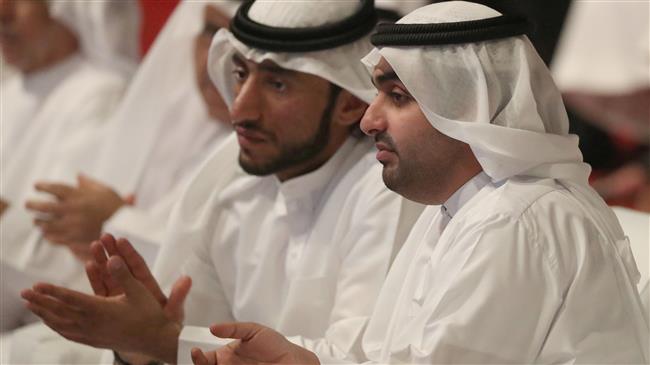Alwaght- Sheikh Rashid bin Hamad al-Sharqi, an Emirati prince who fled his country to Qatar, revealed secret disputes among Emirati rulers, Abu Dhabi’s involvement in money laundering cases and the UAE’s sponsorship of Qatari royals in exile.
The 31-year-old Emeriti prince is the second son of the emir of Fujairah and arrived in Doha on May 16 over claims that his life was in danger because of a dispute with the regime’s rulers.
Rashid, in an interview with the New York Times, accused Emirati leaders of blackmail and corruption, but does not seem to have evidence to support his claims.
He revealed that the rulers of Abu Dhabi did not consult any of the other rulers before launching the military aggression on neighboring Yemen, and that the actual Emirati death toll was higher than announced. He said, after more than three years, large number of Emirati soldiers who were killed in Yemen originated from the small emirates such as Fujairah. According to the Prince, this has been ignored by the media.
“There have been more deaths from Fujairah than anywhere else,” he noted. “I am the first in a royal family going out of the UAE and telling everything about them,” Sheikh Rashid added.
Saudi Arabia and some of its vassal states, including the UAE, launched a brutal aggression against Yemen in March 2015 in an attempt to reinstall its former regime, which had been an ally of Riyadh but had resigned and initially fled into exile.
The offensive initially consisted of a bombing campaign but was later coupled with a naval blockade and the deployment of ground forces into Yemen. Neither the war not the blockade have been mandated by the United Nations (UN).
The Yemeni Ministry of Human Rights announced in a statement on March 25 that the war had left 600,000 civilians dead and injured until then. The war and the accompanying blockade have also caused famine across Yemen.
The report comes as Qatar is in the midst of a Saudi-led diplomatic and trade boycott.
Saudi Arabia, the UAE, Bahrain and Egypt all cut off diplomatic ties with Qatar on June 5 last year, after officially accusing it of “sponsoring terrorism.”
The administration of Saudi-backed and resigned Yemeni president, Abd Rabbuh Mansur Hadi, Libya, the Maldives, Djibouti, Senegal and the Comoros later joined the camp in ending diplomatic ties with Doha. Jordan downgraded its diplomatic relations as well.
Qatar's Foreign Ministry later announced that the decision to cut diplomatic ties was unjustified and based on false claims and assumptions.
On June 9, Qatar strongly dismissed allegations of supporting terrorism after the Saudi regime and its allies blacklisted dozens of individuals and entities purportedly associated with Doha.
On June 23, Saudi Arabia and its allies released a 13-point list of demands, including the closure of Al Jazeera television network and downgrade of relations with Iran, in return for the normalization of diplomatic relations with Doha.
The document containing the demands by Saudi Arabia, Egypt, the UAE and Bahrain also asked Qatar to sever all ties with the Muslim Brotherhood and the Lebanese Hezbollah resistance movement.



























